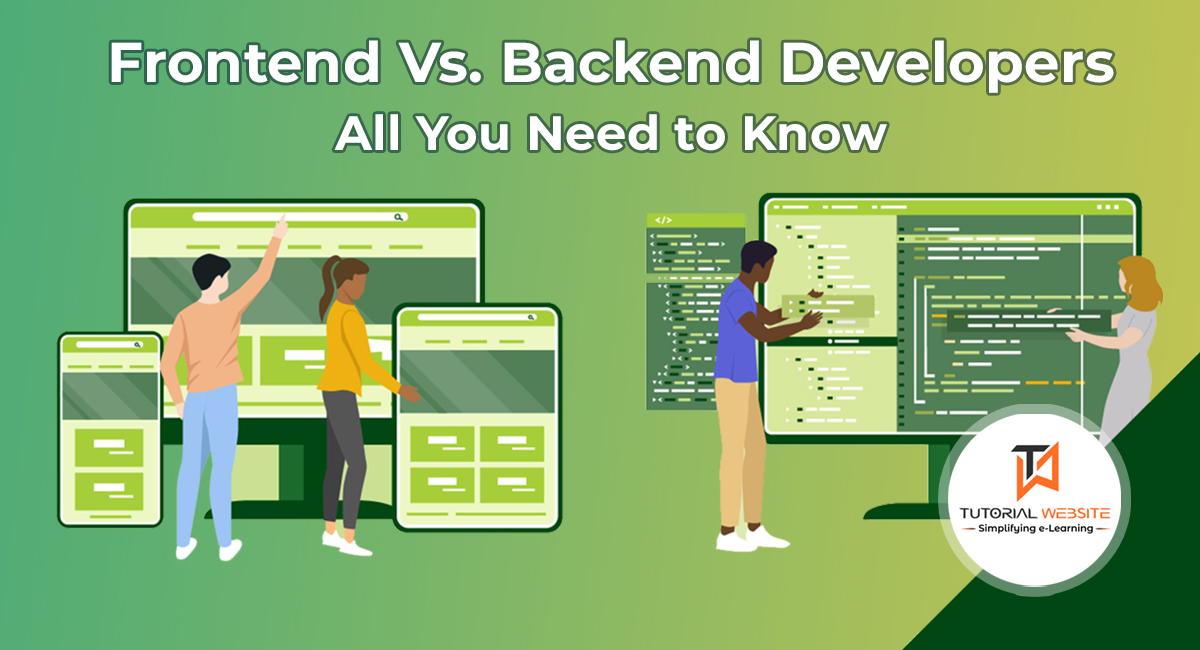A web developer’s job is almost always listed as one of the best-paying IT jobs. Well, why not? In today’s digital world, web developers are essential. Whether it’s a beautiful website, a good e-commerce site, or another web-based app — it’s all made by a web developer.
If you want to be a web developer, you’ll be happy to hear that full-stack developer skills are in high demand. But do you know how full-stack web development, frontend web development, and backend web development compare? In other words, are you aware of what’s different about these jobs? Let’s take a look.
Suggested Article: Why python is most suitable for Deep Learning, Machine Learning, and Artificial Intelligence
A Glimpse of Their Differences
What is a Front-end Developer?
Front-end developers are in charge of making sure that the visual parts of a website work well. They also work on essential elements of website development, such as navigation, buttons, and anything else that helps the website be seen more.
This is why HTML, JavaScript, and CSS are often used to ensure that your website works well. This lets people interact with a website in a free and easy way.
What Does a Back-end Developer Do?
Back-end developers build things on the server side. They pay attention to databases, scripting, and the structure of websites. These experts also keep an eye on how the site works, how to make changes, and keep all the functions behind the scenes up to date.
Required Development Technologies
Front-end Development
- HTML is the language used on the World Wide Web. It stands for “Hyper Text Markup Language.” The standard language for formatting text is used to make and show Web pages. There are two parts to an HTML file. 1) the text on the page and 2) the tags that make it look right on the pages.
- CSS (Cascading Style Sheets) is a simple language that can be used for HTML elements. It is often used in web design, and it is also often used in XHTML.
- JavaScript is the most popular and open-source, client-side scripting language. Many browsers use it to improve how a website interacts with its users.
Back-end Development
- A backend engineer should have a working knowledge of at least one server-side or backend programming language, such as Java, Ruby, or Dot Net.
- One of the essential skills for backend developers is familiarity with the many different DBMS technologies. In this context, popular database management systems include MySQL, Oracle, and Redis. Knowing about caching mechanisms such as varnish and Redis would be beneficial.
- Experience working with IIS servers, including Apache, and Microsoft IIS, would be helpful. When it comes to running servers, having a solid experience in Linux is also of enormous assistance.
- They must also have a solid understanding of APIs and web services. It would be beneficial to know about both the creation and consumption of REST and SOAP services.
Responsibilities and Roles
Front-end Developers
- HTML defines the parts of the page.
- Use CSS to make them look nice.
- Work on making JavaScript interactive.
- Frameworks are used to improve productivity.
- They are in charge of things like version control, automation, content management systems, etc.
- Analyze how a website works on the client side to learn more about how people use it.
Back-end Developers
- They must create the page’s parts and content on any web server in real-time.
- Programming in PHP, Java, JavaScript, Perl, Python, and Ruby can be used to make web pages.
- Help the web development team ensure that end users get answers quickly.
- Work on software version control using CVS, Git, and SVN.
- They should know what the website’s goals are and come up with good ways to reach those goals.
- Manage API resources that can be used on different devices.
- Involved in designing a system’s architecture and analysing data from data science.
- Put together the system’s logic, which runs on different devices.
- They build frameworks or architecture.
What to Choose?
You can find work as a skilled front-end developer or a skilled back-end developer. Look no further and browse for software development courses. People with good experience and a strong portfolio can have promising careers and get high-paying jobs at startups, large organizations, and companies.
Key Differences
| Basis of Difference | Front-end developer | Back-end developer |
| Development | They are in charge of how a website looks. | Backend developers work on server-side development. They pay attention to databases, scripting, and the structure of websites. |
| Language | HTML, CSS, and JavaScript are front-end web development languages. | Back-end programming languages are PHP, Java, and.Net. |
| Application | Front-end developers design the look of a website by taking user input and making changes based on how it works. | Back-end developers create an application for the front end that helps with support, security, and managing content. |
| Implementation | Front-end developers must know how to work well on a website or app’s design and UI/UX. | Back-end developers need to understand how to implement algorithms and solve problems with the system. |
| Salary | Front-end developers make an average amount of $104,405 yearly. | Back-end developers make an average of $120,798 per year |
Demand for skilled full-stack developers is at an all-time high, and it doesn’t look like it will slow down soon. In the next ten years, the number of jobs for web developers will grow by 13%, which is much faster than the average growth rate for any other job.
Web developers get good pay and are seen as valuable assets, but they must keep learning and adapting to new trends and technologies to stay on top of their game. Being a full-stack developer can be a rewarding job for you if you want to work in a fast-paced field. To become the most skilled developer, go through advanced software engineering. You’ll be on the right track if you take an online full-stack developer course, and you can start learning the different parts of full-stack development quickly and easily right now.
Also Read: Why You Need To Leverage Blockchain For Your Business Today
Final Word
Millions of new websites are added annually to the 1.5 billion existing sites. This means that more web developers are needed to build them. Web developers don’t have to worry about not being able to find work. So, it’s easy to see why many people choose to work in web development.

Nidhi Maurya is a professional blogger and Content Writer who writes about a variety of topics related to his niche, including Web Tech, SEO, and digital marketing.





